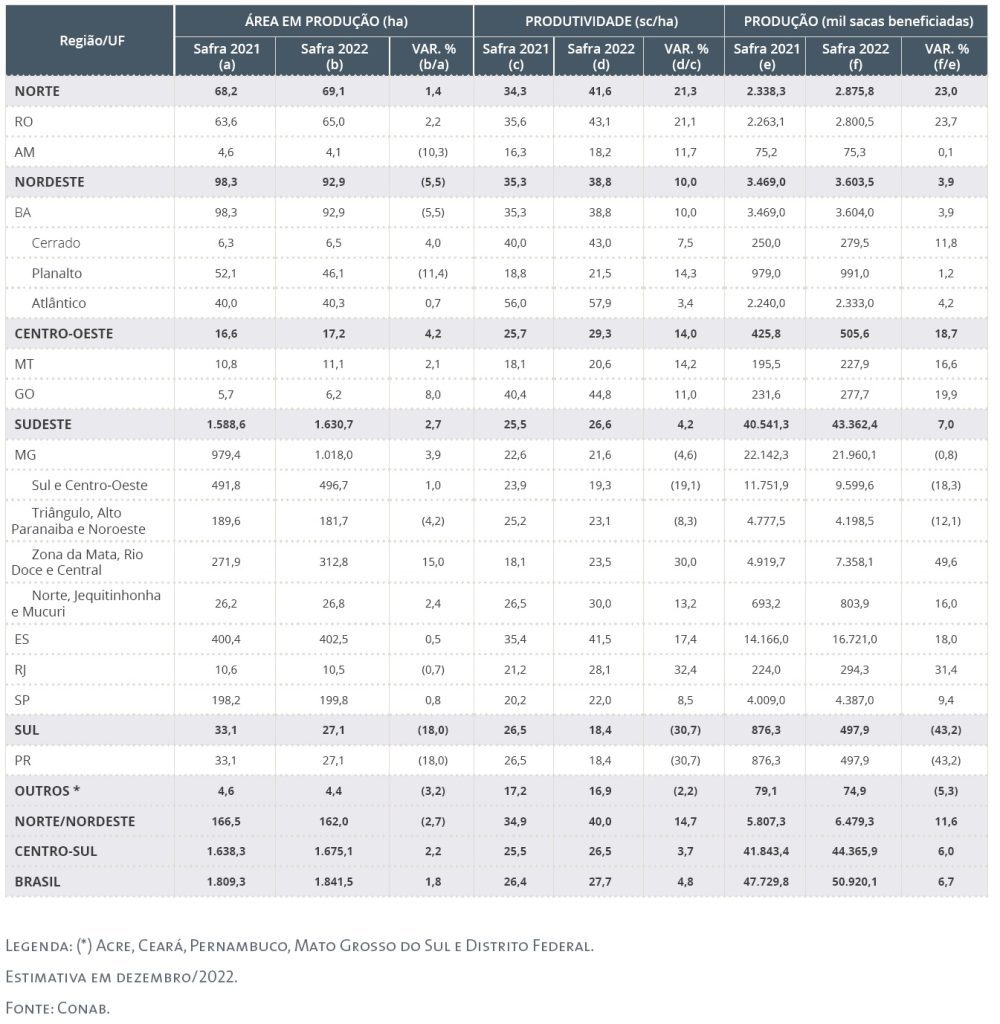MILAN – In its fourth survey for this year, Brazil’s National Supply Company (CONAB) raised its estimate for coffee production in CY 2022/23 by over half a million bags to 50.92 bag, a 6.7% increase over last year. CONAB pegs the crop of Arabica at 32.72 million bags. This disappointing figure is due to the unfavourable weather conditions in 2022, with drought and frost.
On the other hand, the Robusta (conillon) crop reached an all time high of 18.2 million bags, up 11.7%. Robusta production was boosted by good weather conditions and improved productivity.
Nonetheless, the bureau highlighted that the Arabica result was significantly lower than that achieved in 2020, the last “on” year for Brazil, which has alternate higher and lower Arabica-producing years.
Planted area is estimated by CONAB at 2.2 million hectares, 1.84 million (+1.8%) of which are productive. Arabicas account for 1.45 ha, Robustas for 389,000, up 1.3% and 3.5% respectively.
Productivity rose 4.8% to 27.7 bags per ha. Arabica yields rose marginally (2.7%) to 22.5 bags per ha. Robusta yields were up by 7.9% to 46.8 bags per ha.
Minas Gerais, Brazil’s largest largest coffee-producing state, saw even a slight decline in production (-0.8%) to little less of 22 million bags. Productivity dropped to 21.6 bags per ha, down by 4.6% compared to last year’s off-year.
Production fell sharply in the regions of Sul e Centro-Oeste (-18.3%) and Triângulo, Alto Paranaiba e Noroeste (-12.1%). This was partly offset by higher crops in Zona da Mata, Rio Doce e Central (+49.6%) and Norte, Jequitinhonha e Mucuri (+16%).
Record high production was recorded in Espírito Santo. Robusta output rose by 10.1% to 12.358 million. Arabica output surged a whopping 48.1% to 4.363 million bags.
São Paulo partially recovered to 4.387 million bags, up 9.4% on year. Bahia rose 3.9% to 3.6 million bags, of which 1.27 million of Arabica and 2.333 of Robusta.
Rondônia increased its production by 23.7% to 2.8 million. Finally, Paraná saw a sharp decline in production (-43.2%) to les than half a million bags.
“The climatic adversities suffered, even before the beginning of the harvest, with long periods of water restriction and frosts in 2021…. contributed decisively” to the disappointing yield, says CONAB.
The Agency underlined too the blow from persistent rain in 2022, which caused “a large leaching of potassium, an important nutrient in the synthesis and transport of carbohydrates to the fruits”.
As a further blow, losses in processing were higher than had been expected, with a “greater amount” of coffee needed “to obtain a processed bag”.


















